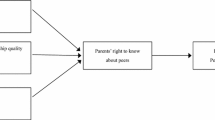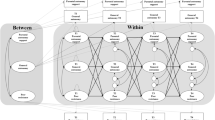Abstract
Despite a growing body of research on parental management of peer relationships, little is known about the relationship between parental management of peers and early adolescents’ social skills or the precursors to parental management of peer relationships. The goals of this short-term longitudinal investigation were to examine the relationship between parental management of peers (consulting and guiding), conflict about peers, and adolescents’ social skills (cooperation, assertion, responsibility, empathy, and self-control) and to examine potential precursors (goals of improving peer relationships and beliefs about authority over peer relationships) to parental management of peer relationships. A predominantly White sample (71%) of 75 seventh-graders (57% female) and their primary caregivers participated in the 9-month investigation. Caregivers completed questionnaires regarding goals of improving their adolescents’ peer relationships, beliefs about parental authority over peer relationships, parental management of peers, and adolescents’ social skills. Adolescents completed questionnaires regarding their social skills. Path analyses suggest that a greater number of caregivers’ goals of improving peer relationships and higher beliefs about parental authority over peers were related to higher levels of consulting, guiding, and conflict about peers. Higher levels of conflict about peers in conjunction with higher levels of consulting were related to lower levels of assertion and responsibility in peer relationships over time. When parents reported having a greater number of goals of improving peer relationships, adolescents reported higher levels of cooperation, assertion, empathy, and self control over time. Findings suggest that caregivers’ goals and beliefs are important in predicting parental management of peer relationships and adolescents’ social skills over time, and that conflict about peers undermines caregivers’ efforts to be positively involved in adolescents’ peer relationships.
Similar content being viewed by others
References
Aiken, L. S., & West, S. G. (1991). Multiple regression: Testing and interpreting interactions. Thousand Oaks, CA: Sage.
Brown, B. B., & Larson, J. (2009). Peer relationships in adolescence. In R. M. Lerner & L. Steinberg (Eds.), Handbook of adolescent psychology (3rd edition ed., pp. 74–103). Hoboken, NJ: Wiley.
Collins, W. A. (1991). Shared views and parent-adolescent relationships. New Directions for Child Development, 51, 103–110.
Furstenberg, F. F., Cook, T. D., Eccles, J., Elder, G. H., & Sameroff, A. (1999). Managing to make it: Urban families and adolescent success. Chicago: University of Chicago Press.
Gresham, F., & Elliott, S. (1990). Social skills rating system. Circle Pines, MN: American Guidance Service.
Grolnick, W. S., Gurland, S. T., DeCourcey, W., & Jacob, K. (2002). Antecedents and consequences of mothers’ autonomy support. Developmental Psychology, 38, 143–155.
Grolnick, W. S., Ryan, R. M., & Deci, E. L. (1991). Inner resources for school achievement: Motivational mediators of children’s perceptions of their parents. Journal of Educational Psychology, 83, 508–517.
Kan, M., & McHale, S. (2007). Clusters and correlates of experiences with parents and peers in early adolescence. Journal of Research on Adolescence, 17, 565–586.
Ladd, G. W., & LeSieur, K. D. (1995). Parents and children’s peer relationships. In M. Bornstein (Ed.), Handbook of parenting, Volume4: Applied and practical parenting (pp. 377–409). Hillsdale, NJ: Erlbaum.
Ladd, G. W., & Pettit, G. S. (2002). Parenting and the development of children’s peer relationships. In M. Bornstein (Ed.), Handbook of parenting, Volume 5: Practical issues in parenting (pp. 269–309). Mahwah, NJ: Erlbaum.
Laird, R. D., Pettit, G., Mize, J., Brown, E. G., & Lindsey, E. (1994). Mother-child conversations about peers: Contributions to competence. Family Relations, 43, 425–432.
McDowell, D. J., & Parke, R. D. (2009). Parental correlates of children’s peer relations: An empirical test of a tripartite model. Developmental Psychology, 45, 224–235.
Mize, J., & Pettit, G. (1997). Mothers’ social coaching, mother-child relationship style, and children’s peer competence: Is the medium the message? Child Development, 68, 312–332.
Mounts, N. S. (2000). Parental management of adolescent peer relationships: What are its effects on friend selection? In K. A. Kerns, J. M. Contreras, & A. M. Neal-Barnett (Eds.), Family and peers: Linking two social worlds. Westport, CT: Greenwood/Praeger.
Mounts, N. S. (2001). Young adolescents’ perceptions of parental management of peer relationships. Journal of Early Adolescence, 21, 92–122.
Mounts, N. S. (2004). Adolescents’ perceptions of parental management of peer relationships in an ethnically diverse sample. Journal of Adolescent Research, 19, 446–467.
Mounts, N. S. (2007). Adolescents’ and their mothers’ perceptions of parental management of peer relationships. Journal of Research on Adolescence, 17, 169–178.
Mounts, N. S. (2008). Linkages between parenting and peer relationships: A model for parental management of adolescents’ peer relationships. In M. Kerr, H. Stattin, & R. Engels (Eds.), What can parents do: New insights into the role of parents in adolescent problem behaviour (pp. 163–189). West Sussex, UK: Wiley.
Mounts, N. S., & Kim, H. S. (2009). Parental management of early adolescents’ dating in an ethnically diverse sample. Journal of Adolescent Research, 24, 531–560.
Parke, R. D., & Buriel, R. (2006). Socialization in the family: Ethnic and ecological perspectives. In N. Eisenberg (Ed.), Handbook of child psychology: Social, emotional, and personality development (Vol. 3) (pp. 429–504). Hoboken, NJ: Wiley.
Parke, R. D., Killian, C. M., Dennis, J., Flyr, M. L., McDowell, D. J., Simpkins, S., et al. (2003). Managing the external environment: The parent and child as active agents in the system. In L. Kuczynski (Ed.), Handbooks of dynamics in parent-child relations (pp. 247–270). Thousand Oaks, CA: Sage.
Rubin, K. H., Bukowski, W., & Parker, J. (2006). Peer interactions, relationships, and groups. In In N. Eisenberg (Ed.), Handbook of child psychology: Social, emotional, and personality development (Vol. 3) (pp. 571–645). Hoboken, NJ: Wiley.
Ryan, R. M., & Deci, E. L. (2000). Self-determination theory and the facilitation of intrinsic motivation, social development, and well-being. American Psychologist, 55, 68–78.
Simpkins, S. D., & Parke, R. D. (2002). Maternal monitoring and rules as correlates of children’s social adjustment. Merrill-Palmer Quarterly, 48, 360–377.
Smetana, J. (1988). Adolescents’ and parents’ conceptions of parental authority. Child Development, 59, 321–335.
Smetana, J. G., & Asquith, P. (1994). Adolescents’ and parents’ conceptions of parental authority and personal autonomy. Child Development, 65, 1147–1162.
Soenens, B., & Vansteenkiste, M. (2005). Antecedents and outcomes of self-determination in 3 life domains: The role of parents’ and teachers’ autonomy support. Journal of Youth and Adolescence, 34, 589–604.
Steinberg, L. (1990). Autonomy, conflict, and harmony in the family relationship. In S. S. Feldman & G. R. Elliott (Eds.), At the threshold: The developing adolescent (pp. 255–276). Cambridge, MA: Harvard University Press.
Tilton-Weaver, L. C., & Galambos, N. (2003). Adolescents’ characteristics and parents’ beliefs as predictors of parents’ peer management behaviors. Journal of Research on Adolescence, 13, 269–300.
Tisak, M., & Tisak, J. (1990). Children’s conceptions of parental authority, friendship, and sibling relations. Merrill-Palmer Quarterly, 36, 347–367.
Updegraff, K. A., McHale, S. M., Crouter, A. C., & Kupanoff, K. (2001). Parents’ involvement in adolescents’ peer relationships: A comparison of mothers’ and fathers’ roles. Journal of Marriage and the Family, 63, 655–668.
Way, N., Greene, M. L., & Mukherjee, P. P. (2007). Exploring adolescents’ perceptions of parental beliefs and practices related to friendships in diverse ethnic communities. In B. B. Brown & N. S. Mounts (Eds.), Linking parents, family to adolescent peer relations: Ethnic, cultural considerations. New Directions in Child, Adolescent Development, No. 116 (pp. 35–50). San Francisco: Jossey-Bass.
Youniss, J., DeSantis, J., & Henderson, S. (1992). Parents’ approaches to adolescents in alcohol, friendship, and school situations. In I. Sigel, A. V. McGillicuddy-Delisi, & J. J. Goodnow (Eds.), Parental belief systems: The psychological consequences for children (pp. 199–216). Hillsdale, NJ: Lawrence Erlbaum.
Author information
Authors and Affiliations
Corresponding author
Additional information
This material is based upon work supported by the National Science Foundation under Grant No. 0131664. Any opinions, findings, and conclusions or recommendations expressed in this material are those of the author and do not necessarily reflect the views of the National Science Foundation.
Rights and permissions
About this article
Cite this article
Mounts, N.S. Parental Management of Peer Relationships and Early Adolescents’ Social Skills. J Youth Adolescence 40, 416–427 (2011). https://doi.org/10.1007/s10964-010-9547-0
Received:
Accepted:
Published:
Issue Date:
DOI: https://doi.org/10.1007/s10964-010-9547-0




